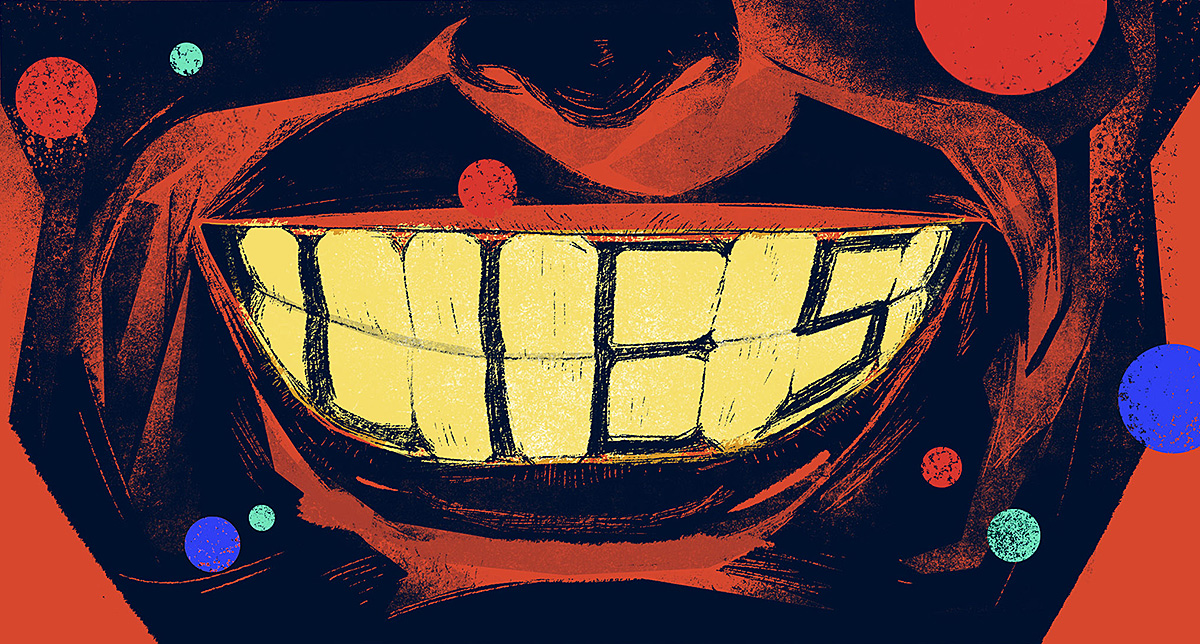
Illustration by Dushan Milic
One day when I was a child, I bit my little brother. We were wrestling and I remember thinking, "I wonder what it would be like to bite his leg." I wasn't considering a gentle gnaw. I had tested that on myself. So I chomped. My brother wailed in pain and ran off to tell my mother.
While I waited for the inevitable, I did what people do: I made a choice between two options.
Option 1: tell the truth in all its haunting simplicity. Yes, I bit him. Why? Because I wanted to see what it felt like.
Option 2: lie.
I knew the consequences of option 1. There would be shouting and pointing, forced apologies and privations of various sorts. No fruit cocktail with ice cream, no Sesame Street, no jumping through the sprinkler or making a snowman or jumping in the leaves (I forget the season of my shame).
There was something delicious about option 2. Even if I failed in my lie, there was a chance I could avoid punishment. With a well-constructed lie I entered a place of hopeful uncertainty. I heard my mother's heels on the green shag carpet of my childhood home. She turned the corner with her cigarette and her angry eyes and asked if it was true.
"No."
"No? You didn't bite him?"
"No."
"What?" She yanked my brother over and showed me the bite mark. I had not broken the skin but tracks of my tiny, miserable teeth were visible. "You didn't bite him? Then what's this?"
"He bit himself."
I will never forget the look on my mother's face. She began with disbelief, moved into confusion - is this really happening? - and entered a moment of forensic analysis. Is such a thing even possible? She looked over at my brother, who shook his tear-streaked face in astonishment. Then she settled on it: colossal disappointment. She had given birth to this.
The motto of the University of Alberta is Quaecumque vera, "Whatsoever things are true." When
I was a student I never quite landed on the meaning of the phrase. What did Paul the Apostle mean when he wrote
it in his letter to the Philippians? Who was Paul? Who were the Philippians?
When I eventually took a religious studies course and looked it up, it seemed to mean what I always thought it meant: the truth is better, more beautiful, more dignified, more honourable than the easier route of, "He bit himself."
Lying is a profoundly human thing, whether we're four or 74. We empathize with liars, when they apologize, because we have all been there with the taste of our brother's leg in our mouths.
It does seem that for a while, a brief moment in human history, there was a category of behaviour that we more or less agreed upon called "lying." There were consequences for doing it. When a researcher or a journalist or a police officer or a private detective or a mother caught us in our lie, our reputation was at stake. A lie was impure, a dangerous thing that reached deep into us. A lie could end our careers, ruin our enterprises, destroy us.
I once thought the explosion of information on the Internet would make official lying more difficult than ever, even obsolete. Today, we're all researchers. We can fact-check a political speech in real time, with our phones.
The trouble is that most of us consume media, and support governments and political parties, that reinforce our strongest opinions and feelings. A lie has become "whatever my enemy says." Go ahead, fact-check. Call out the liars on social media. And see what happens, you elitists, you professors, you (insert racial slur).
I don't want my daughters to choose option 2, "He bit himself." They'll be tempted, of course, despite what they learn in school and in university. But I fear they will graduate into an era of strategy, not an era of honour and dignity and beauty, into far more "whatsoever" than "things are true."
We at New Trail welcome your comments. Robust debate and criticism are encouraged, provided it is respectful. We reserve the right to reject comments, images or links that attack ethnicity, nationality, religion, gender or sexual orientation; that include offensive language, threats, spam; are fraudulent or defamatory; infringe on copyright or trademarks; and that just generally aren’t very nice. Discussion is monitored and violation of these guidelines will result in comments being disabled.